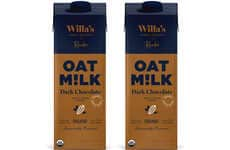
Students from Pratt Institute Designed Compostable Water Filters
Elena Rahman — October 18, 2021 — Eco
References: dezeen
Graduate students Charles Bohning and Mary Lempres designed a collection of carbon compostable water filters. The students from Pratt Institute made the collection without any use of fossil fuels. Each filter is made from food waste, making it a sustainable design.
The range dubbed Strøm includes four pieces. Bohning and Lempres' collection features a sustainable substitute for Brita filter cartridges and purifying sticks that users can add to cups or bottles for a clean drinking experience. It also includes a self-cleaning pitcher and a carafe. All items in the collection are compostable for a sustainable disposal process. The team formulated pyrolysis and biochar components from food waste to ensure a safe decomposition of its products in landfills.
Image Credit: Bohning / Lempres
The range dubbed Strøm includes four pieces. Bohning and Lempres' collection features a sustainable substitute for Brita filter cartridges and purifying sticks that users can add to cups or bottles for a clean drinking experience. It also includes a self-cleaning pitcher and a carafe. All items in the collection are compostable for a sustainable disposal process. The team formulated pyrolysis and biochar components from food waste to ensure a safe decomposition of its products in landfills.
Image Credit: Bohning / Lempres
Trend Themes
1. Compostable Filters - The trend of producing compostable filters made from food waste offers disruptive innovation opportunities in sustainable and eco-friendly consumer products.
2. Sustainability in Design - The trend of incorporating sustainability into consumer products design offers disruptive innovation opportunities and can lead to increased consumer demand for eco-friendly products.
3. Circular Economy Solutions - The trend of designing products that can be composted instead of discarded offers disruptive innovation opportunities for circular economy business models in the consumer products industry.
Industry Implications
1. Consumer Products - Consumer products companies have the opportunity to invest in and develop compostable filter technology and sustainable design to tap into the growing demand for eco-friendly products.
2. Waste Management and Recycling - Waste management and recycling companies can integrate compostable filters into their waste processing systems to promote circular economy and reduce landfill waste.
3. Education and Research - Educational institutions and research organizations can further develop compostable filter technology and sustainable design to foster innovation and address environmental concerns.
5.4
Score
Popularity
Activity
Freshness
























